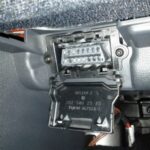Just a week after excitedly installing a new Parrot Asteroid Smart system in my SVT, the dreaded engine warning light illuminated on the dashboard. Knowing my car intimately, I could tell nothing felt or sounded amiss. However, the thought of a potentially hefty diagnostic fee at the dealership prompted me to consider a smarter approach: investing in an OBD II scanner. These handy devices plug into your car’s OBD II port—a standard feature in all post-1996 vehicles—and decode the mystery behind that warning light, along with providing a wealth of other vehicle data.
But why settle for a traditional scanner when you can leverage the power of your smartphone or tablet? Bluetooth OBD2 adapters are now readily available, offering a seamless connection to your devices and unlocking a world of diagnostic possibilities through user-friendly apps.
Among the numerous options on the market, the Bafx Obd2 Adapter caught my attention. Priced affordably around $24, this compact adapter is about the size of a deck of cards and compatible with laptops and Android devices. Its impressive Amazon review score (4.6 out of 5 stars from over 700 reviews at the time of purchase), with a significant majority being 5-star ratings, signaled a reliable and well-regarded product in its category. This positive feedback instilled confidence, making the BAFX adapter a compelling choice for my needs.
To utilize the BAFX adapter, you’ll need a compatible OBD2 app. Torque is a popular choice, offering both a free “Lite” version and a more feature-rich $5 “Pro” version. I opted to start with the free version to test the waters.
Installation was straightforward. After downloading the Torque Lite app on my tablet, I simply followed the clear instructions provided with the BAFX adapter. The connection process was seamless, working perfectly on the first attempt.
While the initial connection was easy, the Torque Lite app presents a blank dashboard upon first launch. This is by design, allowing you to customize the display by adding various gauges and readouts from an extensive list of parameters. Although the interface may not be the most visually stunning, its functionality is undeniable. You can monitor crucial data such as fuel economy (displayed in Imperial gallons, unfortunately), coolant temperature, and even utilize your device’s accelerometers for performance metrics like acceleration times.
When it comes to error codes, the app effectively displays both the code number and a brief description. This information is invaluable for initiating further investigation. In my case, the code “P1518” was revealed, which, for my SVT Focus, pointed to an issue with the IMRC (Intake Manifold Runner Control). A quick consultation with online SVT forums provided valuable insights and troubleshooting steps. Following community recommendations, I used ramps to access the underside of my car, wiggled the relevant cable, gently tapped the actuator box, cleared the code using the app, and to my relief, the engine warning light disappeared!
Now, while the immediate issue seemed resolved, a degree of uncertainty remained. My car could be either completely fixed, or the intake manifold might be stuck in its short position, masking the underlying problem while maintaining acceptable engine performance. I reasoned that if the latter were true, the engine light would likely reappear. As the car was driving smoothly, I decided to monitor the situation and address it more thoroughly during my next scheduled service.
Exploring the upgraded Torque Pro app revealed a more refined and feature-rich experience. For a nominal $5 investment, the Pro version offers a more polished interface and expanded capabilities. However, for basic diagnostics and occasional use, the free Torque Lite app is likely sufficient for most users. Unless you intend to constantly monitor vehicle data while driving, the Lite version provides ample functionality for diagnosing engine lights and checking vehicle parameters.
It would be fantastic to see app integration with systems like the Parrot Asteroid in the future, further enhancing in-car diagnostics and connectivity.
The Verdict
The BAFX OBD2 adapter is an excellent and cost-effective tool for car owners. It performs precisely as advertised, offering the potential to save significant money on diagnostic fees while providing valuable insights into your vehicle’s health. The accompanying app ecosystem, particularly Torque, adds significant value and user-friendliness. For a mere $24, the BAFX adapter not only empowers you to diagnose your own engine issues but also to assist friends and family. Perhaps a reasonable $50 “diagnostic fee” for helping others is in order!
